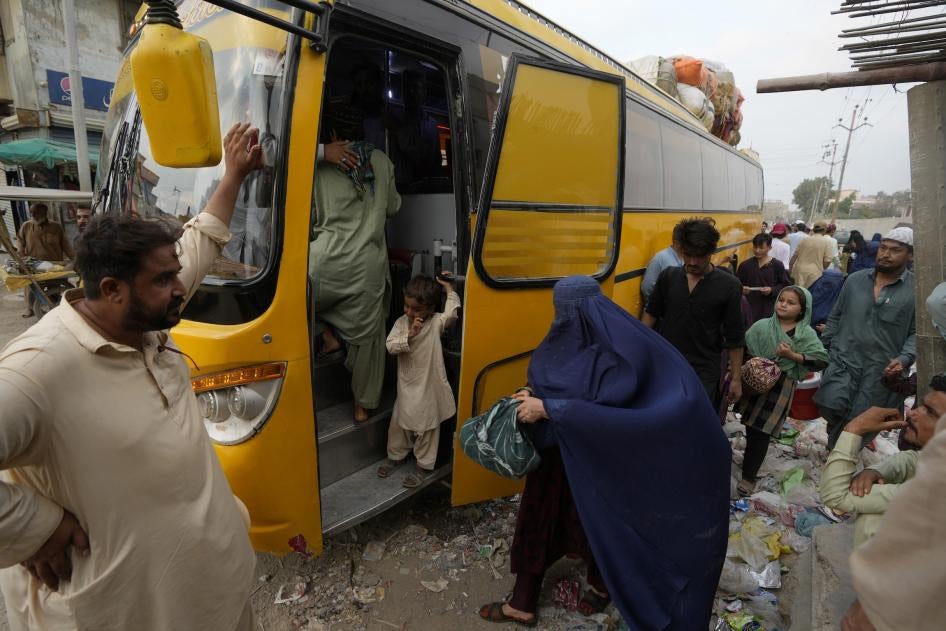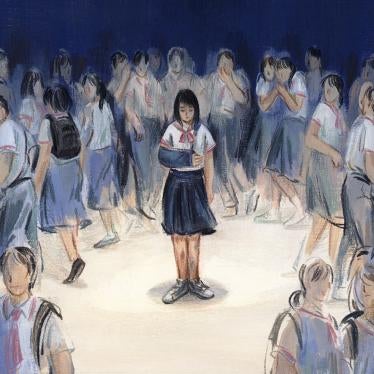(New York) – Pakistani authorities’ threats to deport more than one million Afghans puts them at grave risk of being returned to persecution and other abuse, Human Rights Watch said today.
Pakistan’s Interior Ministry announced on October 3, 2023, that all migrants living without legal status in Pakistan had 28 days to leave voluntarily or face deportation. Broad calls by Pakistani officials for mass deportation have instigated an increase in police abuse against Afghans, including harassment, assault, and arbitrary detention.
“Afghans in Pakistan have long been a political football kicked back and forth between the two countries with little regard for their rights,” said Patricia Gossman, associate Asia director at Human Rights Watch. “With resettlement countries dragging their feet and the United Nations caught off guard by the Pakistani announcement, Afghans are facing the threat of being returned home to face Taliban persecution and a humanitarian crisis.”
The United Nations High Commissioner for Refugees (UNHCR) reported that as of October 2023, there were 3.7 million Afghans in Pakistan, among them some 700,000 Afghans who fled to Pakistan after the Taliban takeover on August 15, 2021. Many of this last group were encouraged to apply from Pakistan for resettlement programs in the United States, Canada, Germany, and other countries. While 200,000 have been resettled, others have been left in limbo. Afghan women and girls have often faced greater barriers to obtaining asylum, as destination countries have often prioritized assisting Afghans – overwhelmingly men – who contributed to their military efforts.
Pakistani officials have blamed Afghans for a recent uptick in attacks by militant groups, linking these to “illegal migrants.”
Afghans who were counted in Pakistan’s only census of Afghans in 2005 were given proof-of-registration cards, which were largely accepted as confirming their status as refugees. These registrations stopped in February 2007, with Pakistan extending the validity of existing cards on successive occasions and extending citizenship to approximately 840,000 Afghans. The absence of any subsequent registration mechanism after 2007, and UNHCR’s limited ability to process asylum seekers in Pakistan, has meant that many Afghans needing protection in Pakistan since 2007 have had little chance of obtaining it, generally facing delays of a year or more just to schedule interviews. Among more than one million who remain unregistered are thousands of Afghans, including women and girls, who fled Afghanistan after August 2021.
UNHCR issued non-return advisories in 2021, 2022, and 2023, calling for a bar on the forced return of Afghan nationals. Recently, UNHCR has urged Pakistan not to forcibly return Afghans, saying that returns could result in serious rights violations.
The UN and international donors should press Pakistan to end abuses against Afghans and protect Afghan asylum seekers in Pakistan, Human Rights Watch said. Pakistani authorities and UNHCR should agree on an expedited process of registering refugees, making assessments in a manner consistent with international law. Mass deportations, coerced or otherwise, may amount to a breach of Pakistan’s obligations as a party to the UN Convention Against Torture and violate the customary international law principle prohibiting “refoulement,” the forcible return of anyone to a place where they would face a genuine risk of persecution, torture, or other ill-treatment, or a threat to their life.
In 2016, Pakistani authorities coerced hundreds of thousands of registered Afghan refugees into returning to Afghanistan. Pakistan claimed the returns were voluntary, but Human Rights Watch documented widespread abuse by Pakistan’s police, including detentions, beatings, and confiscation of documents. Pakistan’s threat to forcibly return Afghans comes at a particularly dangerous time, as the human rights situation in Afghanistan has worsened under the Taliban. Abuses by the Taliban, especially against women and girls, have escalated, imposing sweeping violations of the rights of women and girls to study, work, access health care, and move freely. Among those stranded in Pakistan are Afghan women’s rights defenders who were forced to flee after retaliation – including torture – by the Taliban for their activism. Afghanistan is also in the midst of an economic and humanitarian crisis that has left over half the population – 28 million Afghans – dangerously food-insecure, with women-headed households disproportionately affected. Malnutrition levels among children have soared.
The Pakistani government should avoid recreating in 2023 the conditions that pressured Afghan refugees to leave in 2016, Human Rights Watch said. It should end police abuses and deportation threats and work with UNHCR to resume registrations of Afghan asylum seekers.
“Countries that promised to provide at-risk Afghans with resettlement abroad should live up to their promises,” Gossman said. “Germany and most other European Union countries, the US, UK, Canada, and others have fallen far short on the numbers of Afghans they pledged to resettle.”







